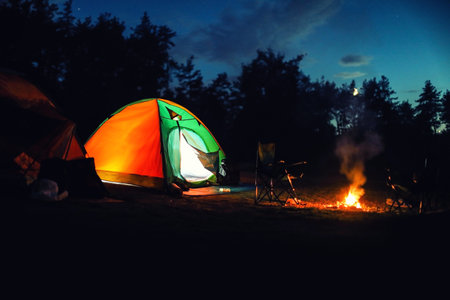Introduction: Embracing Green Camping in the UK
In recent years, sustainable camping has become more than just a buzzword across Britain—it’s a movement that’s reshaping how we explore the countryside. With growing awareness of environmental issues and a collective push towards greener living, campers are now seeking ways to enjoy the great outdoors without leaving a heavy footprint. The UK, with its patchwork of rolling hills, ancient woodlands, and rugged coastlines, offers a stunning backdrop for eco-friendly adventures. But as more people flock to these natural havens, the need for responsible camping has never been greater. Choosing an eco-friendly campsite isn’t just about reducing waste or saving energy; it’s about protecting our wild spaces for future generations while supporting local communities. In this guide, we’ll dive into some of the top eco-conscious campsites dotted across the UK, helping you camp responsibly and tread lightly on Britain’s treasured landscapes.
2. What Makes a Campsite Eco-Friendly?
If you’re keen to camp responsibly in the UK, knowing what truly defines an eco-friendly campsite is essential. Not all campsites are created equal when it comes to sustainability. Here’s what to look out for if you want your getaway to be as green as possible:
Main Features of Eco-Friendly Campsites
| Feature | Description | Why It Matters |
|---|---|---|
| Renewable Energy | Use of solar panels, wind turbines, or other green energy sources for powering facilities. | Reduces carbon footprint and reliance on fossil fuels. |
| Recycling Facilities | Comprehensive waste separation bins, composting toilets, and guidance for campers on recycling. | Minimises landfill waste and encourages responsible disposal habits. |
| Low-Impact Pitches | Pitches designed to avoid damaging the land—often grass-only, no concrete bases, and limited vehicle access. | Protects local flora and soil quality while maintaining natural beauty. |
| Wildlife Conservation Efforts | On-site nature reserves, wildflower meadows, bat boxes, or bee hotels; information boards about local wildlife. | Supports biodiversity and offers educational opportunities for guests. |
Additional Green Initiatives You Might Spot
You’ll often find UK eco-campsites going the extra mile with initiatives like rainwater harvesting, chemical-free cleaning products, or promoting local food suppliers. Some even run workshops about sustainable living or offer guided wildlife walks to help campers connect with nature in a meaningful way.
A Practical Note from Experience
From my own stays at various British eco-campsites, those that prioritise both guest comfort and genuine sustainability stand out. Look for places where staff are happy to explain their green policies—it’s usually a good sign that they walk the talk when it comes to caring for the countryside.

3. Top Eco-Friendly Campsites Across England, Scotland, Wales, and Northern Ireland
When it comes to camping responsibly, the UK offers an impressive range of eco-friendly campsites that go the extra mile for sustainability. Whether you’re pitching your tent along Cornwall’s rugged coast or enjoying the wild beauty of the Scottish Highlands, these campsites stand out for their commitment to green practices and unique local character.
England: From Cornwall to the Lake District
Treen Farm Campsite, Cornwall
Tucked away on the Penwith Peninsula, Treen Farm Campsite is a family-run gem powered by renewable energy. They pride themselves on organic farming, locally sourced produce, and composting loos. The views over Pedn Vounder beach are simply unbeatable for those seeking a wild yet responsible escape.
The Quiet Site, Lake District
This award-winning site lives up to its name with tranquil surroundings and impressive eco-credentials. Think solar panels, water recycling systems, and their own zero-waste shop. Their quirky glamping pods are constructed from recycled materials—perfect for campers wanting a guilt-free stay in one of England’s most iconic landscapes.
Scotland: Highlands and Islands Retreats
Comrie Croft, Perthshire
Nestled at the foot of the Scottish Highlands, Comrie Croft is all about low-impact camping. Visitors can hike or bike directly from their tent pitches, while facilities include wood-fired showers and a Scandinavian-inspired eco hostel. They also promote rewilding projects and encourage guests to leave no trace.
Sands Caravan & Camping Park, Gairloch
Overlooking sweeping beaches and dramatic mountains, this campsite uses wind turbines and rainwater harvesting to reduce its environmental footprint. It’s ideal for spotting local wildlife while knowing your stay supports sustainable land management in this stunning part of the Highlands.
Wales: Wild Valleys and Coastal Havens
Cwellyn Arms Eco Camping, Snowdonia
Set beside Llyn Cwellyn lake and under Mount Snowdon’s shadow, this site features off-grid pitches and eco-cabins built from reclaimed timber. With a focus on minimal impact, they provide recycling points throughout and encourage walkers to use public transport links nearby.
Trellyn Woodland Camping, Pembrokeshire
This peaceful woodland site near Abercastle bay features solar-powered facilities and compost toilets. Each pitch is secluded within natural clearings, perfect for those seeking privacy while enjoying sustainable luxury like wood-fired pizza ovens and home-grown veg boxes.
Northern Ireland: Green Escapes with Local Flavour
Ballyness Caravan Park, County Antrim
Just a stone’s throw from Giant’s Causeway, Ballyness boasts eco-friendly practices such as solar-heated showers and extensive wildlife habitats on-site. Their commitment to supporting local produce extends to farm-fresh eggs and honey available for campers each morning.
Why These Campsites Stand Out
What sets these top sites apart isn’t just their breathtaking locations but their dedication to sustainability—from using renewables and encouraging zero waste to fostering biodiversity and community partnerships. By choosing one of these eco-friendly campsites across England, Scotland, Wales, or Northern Ireland, you’ll not only enjoy some of the UK’s finest scenery but also play your part in protecting it for future generations.
4. How to Camp Responsibly in the UK
Camping responsibly is essential for preserving the UK’s breathtaking landscapes and ensuring that future generations can enjoy them too. Whether you’re pitching your tent in a national park or staying at an eco-friendly campsite, following responsible camping practices is a must. Here are some practical tips to help you tread lightly on your next adventure.
Follow Leave No Trace Principles
The Leave No Trace ethos is at the heart of responsible camping. It’s about making as little impact on the environment as possible. Here’s a quick reference guide:
| Principle | How to Apply in the UK |
|---|---|
| Plan Ahead & Prepare | Check weather, local rules, and access rights (especially in Scotland with its unique “right to roam” law). |
| Travel & Camp on Durable Ground | Use designated pitches or established paths; avoid sensitive habitats like peat bogs. |
| Dispose of Waste Properly | Bag all rubbish and take it home if bins aren’t provided. Use composting toilets where available. |
| Leave What You Find | Don’t pick wildflowers or disturb historical sites—leave everything as you found it. |
| Minimise Campfire Impact | Use a camping stove or fire bowl; only light fires where permitted and never leave them unattended. |
| Respect Wildlife | Observe animals from a distance and avoid feeding them; keep dogs under control, especially during lambing season. |
| Be Considerate of Others | Keep noise down, respect fellow campers’ space, and follow site-specific etiquette. |
Adhere to Local Regulations
The UK has varying rules for wild camping. In England, Wales, and Northern Ireland, wild camping without landowner permission is generally not allowed except for specific areas like parts of Dartmoor. In Scotland, wild camping is legal under the Scottish Outdoor Access Code—but always camp responsibly and respect restrictions near lochs or protected areas. Always check signage and local guidelines before setting up camp.
Waste Disposal: Do It Right
Sustainable campsites often provide recycling facilities and compost toilets—use them! If you’re in a remote spot:
- Packing out rubbish: Take all litter home, including food scraps and biodegradable items.
- Toileting: If no facilities are available, bury waste in a small hole at least 30 metres from water sources (except in high-traffic areas where this isn’t appropriate).
Respect Local Wildlife and Communities
The UK’s diverse wildlife—from red squirrels to nesting seabirds—can be easily disturbed by careless behaviour. Keep to marked trails, use binoculars rather than approaching animals, and secure food supplies to avoid attracting wildlife. When passing through rural villages or farmland, close gates behind you, greet locals courteously, and support community-run businesses when possible.
Your Responsible Camping Checklist
| Task | Ticked Off? |
|---|---|
| Packed reusable cutlery/crockery? | ☐ |
| Brought eco-friendly cleaning products? | ☐ |
| Knew site rules before arrival? | ☐ |
| Took all waste home? | ☐ |
A Final Word for Responsible Adventurers
Camping in the UK offers unforgettable experiences—but with that comes the responsibility to protect what makes these places special. By following these tips and embracing a thoughtful approach, you’ll help keep Britain’s natural wonders pristine for years to come.
5. Eco-Friendly Gear and Packing List Essentials
When planning your stay at one of the UK’s top eco-friendly campsites, it pays to be just as mindful with your packing as you are with your choice of destination. Choosing sustainable camping kit not only reduces your environmental footprint but also supports a thriving market for green products available right here in Britain. Below, we’ve rounded up some must-have eco gear you can find at UK outdoor shops and supermarkets, making it easier than ever to camp responsibly.
Reusable Water Bottles and Cups
Avoid single-use plastics by investing in a sturdy reusable water bottle or insulated cup. British brands like Chilly’s and S’well offer BPA-free options that keep your drinks cold or hot for hours—ideal for those unpredictable British weather shifts!
Solar Chargers and Power Banks
Stay connected without relying on mains electricity by opting for solar-powered chargers. Products from companies like Powertraveller or Goal Zero, widely available in UK outdoor retailers, let you recharge devices using just the sun—a perfect fit for off-grid camping.
Compostable Tableware and Toiletries
Look for compostable plates, cutlery, and even bin bags made from plant-based materials at shops like Waitrose or Holland & Barrett. For toiletries, consider solid shampoo bars (try Lush’s UK-made range) and biodegradable soap sheets to cut down on plastic waste.
Sustainable Sleeping Bags and Mats
Many high street stores now stock sleeping bags made from recycled materials or organic cotton, such as Vango’s Earth Collection or Rab’s eco-conscious ranges. Pair them with self-inflating mats crafted from recycled foam for added comfort and peace of mind.
Local Food Storage Solutions
Ditch cling film for beeswax wraps (BeeBee Wraps are made in Cambridge) or reusable silicone bags—both widely available across the UK. These alternatives keep food fresh and reduce landfill waste during your trip.
Packing Responsibly
Remember: when heading to an eco campsite, less is more. Pack only what you need, opt for multipurpose items, and always take your litter home or use onsite recycling points. With the right kit, you’ll enjoy the best of Britain’s wild spaces while treading lightly on the land.
6. Joining the UK’s Eco-Conscious Camping Community
If you’re keen to make a positive impact while enjoying the great British outdoors, becoming part of the UK’s eco-conscious camping community is a rewarding next step. There are plenty of local organisations and digital platforms dedicated to sustainable camping, as well as hands-on volunteer opportunities that let you give back to the landscapes you love.
Get Involved with Local Organisations
Groups like The Wildlife Trusts and the National Trust regularly organise events focused on conservation and sustainable land management. Many eco-friendly campsites partner with these organisations, giving campers the chance to participate in habitat restoration days or wildlife monitoring projects. Getting involved is not only a way to help protect nature, but also a brilliant opportunity to meet like-minded outdoor enthusiasts from across the UK.
Volunteer Opportunities for Responsible Campers
For those who want to get their hands dirty, volunteering schemes abound. Look for campsite-hosted clean-up days or sign up with organisations such as Keep Britain Tidy for national litter-picking campaigns. Some sites even offer free or discounted stays in exchange for helping out with conservation tasks, making it easy to combine an affordable holiday with meaningful action.
Connect Through Digital Platforms
Online communities play a huge role in bringing responsible campers together. Platforms like Pitchup.com and Cool Camping highlight eco-certified sites and share tips for low-impact adventures. Social media groups and apps dedicated to wild camping ethics, gear swaps, and sustainability hacks are growing fast—ideal for sharing experiences, learning about new green destinations, or finding travel buddies who share your values.
By connecting with these networks and lending a hand where you can, you’ll be joining a nationwide movement that’s shaping the future of camping in the UK—one that’s not just about enjoying beautiful places, but protecting them too.


